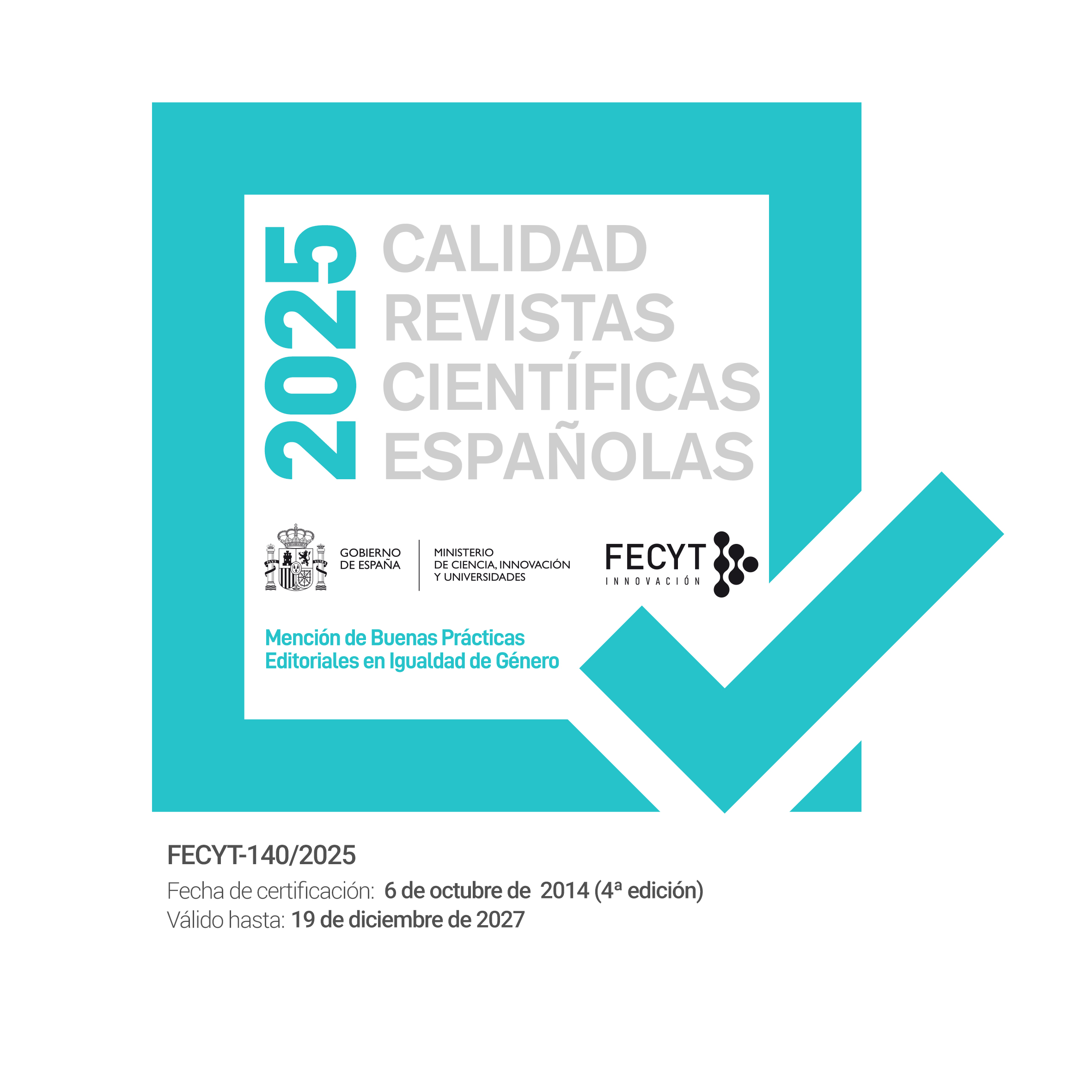Retención docente a través de la teoría de demandas y recursos laborales
DOI:
https://doi.org/10.5944/educxx1.31901Palabras clave:
inteligencia emocional, engagement, actitudes laborales, profesorado, modelo de ecuaciones estructuralesResumen
De acuerdo con la teoría de Demandas y Recursos Laborales, existen diversos factores psicosociales en el trabajo (demandas y recursos laborales) que afectan a los niveles de engagement y a las actitudes laborales del profesorado. Asimismo, la inteligencia emocional se considera un recurso personal clave con efectos positivos sobre la salud ocupacional del profesorado. No obstante, hasta la fecha no se han llevado a cabo estudios integradores que examinen simultáneamente las relaciones de estos factores contextuales y personales y sus relaciones con el engagement y con las actitudes laborales docentes. Así, el objetivo principal de este trabajo ha sido examinar las relaciones entre antecedentes (demandas y recursos laborales) y consecuentes del engagement (actitudes laborales) docente, así como analizar el potencial efecto moderador de la inteligencia emocional. El diseño de la investigación es transversal y se ha llevado a cabo un análisis de modelado de ecuaciones estructurales, contando con una muestra de 734 profesionales docentes (63.8% mujeres; Medad = 44.38; DT = 9.11) de diferentes niveles de especialidad. Se han empleado escalas ampliamente validadas para medir las variables objeto de estudio: agresiones hacia el profesorado, apoyo social organizacional, inteligencia emocional, engagement, satisfacción laboral e intención de abandono. Los resultados han mostrado asociaciones directas e interactivas entre la inteligencia emocional y antecedentes y consecuentes del engagement. Estos hallazgos apuntan al desarrollo de modelos teóricos integradores que consideren el papel de los recursos emocionales del profesorado junto con otros factores personales y contextuales. Finalmente, esta investigación puede contribuir al diseño de programas de desarrollo de las competencias emocionales orientados a la mejora del bienestar y el desempeño docente.
Descargas
Citas
Bakker, A. B., & Demerouti, E. (2017). Job demands–resources theory: Taking stock and looking forward. Journal of Occupational Health Psychology, 22(3), 273–285. https://doi.org/10.1037/ocp0000056
Bakker, A. B., Demerouti, E., & Lieke, L. (2012). Work engagement, performance, and active learning: The role of conscientiousness. Journal of Vocational Behavior, 80(2), 555-564. https://doi.org/10.1016/j.jvb.2011.08.008
Bardach, L., Klassen, R. M., & Perry, N. E. (2022). Teachers’ psychological characteristics: Do they matter for teacher effectiveness, teachers’ well-being, retention, and interpersonal relations? An integrative review. Educational Psychology Review, 34, 259-300. https://doi.org/10.1007/s10648-021-09614-9
Bass, B. I., Cigularov, K. P., Chen, P. Y., Henry, K. L., Tomazic, R. G., & Li, Y. (2016). The effects of student violence against school employees on employee burnout and work engagement: The roles of perceived school unsafety and transformational leadership. International Journal of Stress Management, 23(3), 318–336. https://doi.org/10.1037/str0000011
Côté, S. (2014). Emotional intelligence in organizations. Annual Review of Organizational Psychology and Organizational Behavior, 1, 459–488. https://doi.org/10.1146/annurev-orgpsych-031413-091233
Curran, F. C., Viano, S. L., & Fisher, B. W. (2019). Teacher victimization, turnover, and contextual factors promoting resilience. Journal of School Violence, 18(1), 21–38. https://doi.org/10.1080/15388220.2017.1368394
Dawson, J. F. (2014). Moderation in management research: What, why, when, and how. Journal of Business and Psychology, 29, 1-19. https://doi.org/10.1007/s10869-013-9308-7
De Clercq, D., Bouckenooghe, D., Raja, U., & Matsyborska, G. (2014). Unpacking the goal congruence–organizational deviance relationship: The roles of work engagement and emotional intelligence. Journal of Business Ethics, 124(4), 695-711. https://doi.org/10.1007/s10551-013-1902-0
DeAngelis, K. J., & Presley, J. B. (2011). Toward a more nuanced understanding of new teacher attrition. Education and Urban Society, 43(5), 598–626. https://doi.org/10.1177/0013124510380724
Dzuka, J., & Dalbert, C. (2007). Student violence against teachers: Teachers’ well-being and the belief in a just world. European Psychologist, 12, 253–260. https://doi.org/10.1027/1016-9040.12.4.253
Extremera, N., Mérida-López, S., & Sánchez-Gómez, M. (2019a). La importancia de la inteligencia emocional del profesorado en la misión educativa: impacto en el aula y recomendaciones de buenas prácticas para su entrenamiento. Voces de La Educación, 4(9), 74–97. https://bit.ly/3D5w3a7
Extremera, N., Mérida-López, S., Sánchez-Álvarez, N., Quintana-Orts, C., & Rey, L. (2018, 1-3 marzo). ¿Eres feliz en tu trabajo? Propiedades psicométricas de la adaptación al castellano del Brief Job Satisfaction Measure [póster científico]. II Congreso Internacional de Psicología del Trabajo y Recursos Humanos, Valencia. http://dx.doi.org/10.13140/RG.2.2.35186.61123
Extremera, N., Rey, L., & Sánchez-Álvarez, N. (2019b). Validation of the Spanish version of Wong Law Emotional Intelligence Scale (WLEIS-S). Psicothema, 31(1), 94–100. https://doi.org/10.7334/psicothema2018.147
Fornell, C., & Larcker, D. F. (1981). Evaluating structural equation models with unobservable variables and measurement error. Journal of Marketing Research, 18(1), 39-50. https://doi.org/10.1177/002224378101800104
Gold, M. S., & Bentler, P. M. (2000). Treatments of missing data: A monte carlo comparison of RBHDI, iterative stochastic regression imputation, and expectation-maximization. Structural Equation Modeling: A Multidisciplinary Journal, 7(3), 319–355. https://doi.org/10.1207/S15328007SEM0703_1
Granziera, H., Collie, R., & Martin, A. (2021). Understanding teacher well-being through job demands-resources theory. En C. F. Mansfield (Coord.), Cultivating teacher resilience. International approaches, applications and impact (pp. 229–244). Springer.
Hackett, R. D., Lapierre, L. M., & Hausdorf, P. A. (2001). Understanding the links between work commitment constructs. Journal of Vocational Behavior, 58(3), 392–413. https://doi.org/10.1006/jvbe.2000.1776
Hayes, A. F. (2018). Introduction to mediation, moderation, and conditional process analysis: A regression-based approach (2nd ed.). Guilford Press.
Hu, L. T., & Bentler, P. M. (1999). Cutoff criteria for fit indexes in covariance structure analysis: Conventional criteria versus new alternatives. Structural Equation Modeling, 6(1), 1–55. https://doi.org/10.1080/10705519909540118
Judge, T. A., Locke, E. A., Durham, C. C., & Kluger, A. N. (1998). Dispositional effects on job and life satisfaction: The role of core-self evaluations. Journal of Applied Psychology, 83(1), 17-34. https://psycnet.apa.org/doi/10.1037/0021-9010.83.1.17
Kline, R. B. (2015). Principles and practice of structural equation modeling (4th ed.). Guilford.
Mérida-López, S., & Extremera, N. (2022). Student aggression against teachers, stress, and emotional intelligence as predictors of withdrawal intentions among secondary school teachers. Anxiety, Stress, & Coping, 35(3), 365–378. https://doi.org/10.1080/10615806.2021.1948020
Mérida-López, S., Sánchez-Gómez, M., & Extremera, N. (2020). Leaving the teaching profession: Examining the role of social support, engagement and emotional intelligence in teachers’ intentions to quit. Psychosocial Intervention, 29(3), 141–151. https://doi.org/10.5093/pi2020a10
Moncada, S., Utzet, M., Molinero, E., Llorens, C., Moreno, N., Galtés, A., & Navarro, A. (2014). The Copenhagen Psychosocial Questionnaire II (COPSOQ II) in Spain: A tool for psychosocial risk assessment at the workplace. American Journal of Industrial Medicine, 57(1), 97–107. https://doi.org/10.1002/ajim.22238
Oliveira, S., Roberto, M. S., Pereira, N. S., Marques-Pinto, A., & Veiga-Simão, A. M. (2021). Impacts of social and emotional learning interventions for teachers on teachers’ outcomes: A systematic review with meta-analysis. Frontiers in Psychology, 12, 2543. https://doi.org/10.3389/fpsyg.2021.677217
Pejtersen, J. H., Kristensen, T. S., Borg, V., & Bjorner, J. B. (2010). The second version of the Copenhagen Psychosocial Questionnaire. Scandinavian Journal of Public Health, 38(3), 8–24. https://doi.org/10.1177/1403494809349858
Ryan, S. V., von der Embse, N. P., Pendergast, L. L., Saeki, E., Segool, N., & Schwing, S. (2017). Leaving the teaching profession: The role of teacher stress and educational accountability policies on turnover intent. Teaching and Teacher Education, 66, 1–11. https://doi.org/10.1016/j.tate.2017.03.016
Salanova, M., Schaufeli, W. B., Llorens, S., Peiró, J. M., & Grau, R. (2000). Desde el “burnout” al “engagement”: ¿una nueva perspectiva? Revista de Psicología del Trabajo y de Las Organizaciones, 16(2), 117–134.
Satorra, A., & Bentler, P. M. (2001). A scaled difference chi-square test statistic for moment structure analysis. Psychometrika, 66, 507–514. https://doi.org/10.1007/BF02296192
Schaufeli, W. B., Salanova, M., González-Romá, V., & Bakker, A. B. (2002). The measurement of burnout and engagement: A confirmatory factor analytic approach. Journal of Happiness Studies, 3(1), 71-92. https://doi.org/10.1023/A:1015630930326
Suárez Martel, M. J., & Martín Santana, J. D. (2019). Influence of socio-demographic profile of teachers on their levels of emotional intelligence and burnout. Educacion XX1, 22(2), 93–118. https://doi.org/10.5944/educxx1.22514
Sweetman, D., & Luthans, F. (2010). The power of positive psychology: Psychological capital and work engagement. En A. B. Bakker y M. P. Leiter (Coords.), Work engagement: A handbook of essential theory and research (pp. 54-68). Psychology Press.
Taris, T. W., Leisink, P. L. M., & Schaufeli, W. B. (2017). Applying occupational health theories to educator stress: Contribution of the Job Demands-Resources model. En T. M. McIntyre, S. E. McIntyre, y D. J. Francis (Coords.), Educator stress: An occupational health perspective (pp. 237–259). Springer International Publishing.
Wheeler, A. R., Shanine, K. K., Leon, M. R., & Whitman, M. V. (2014). Student-recruited samples in organizational research: A review, analysis, and guidelines for future research. Journal of Occupational and Organizational Psychology, 87(1), 1–26. https://doi.org/10.1111/joop.12042
Wong, C. S., & Law, K. S. (2002). The effects of leader and follower emotional intelligence on performance and attitude: An exploratory study. The Leadership Quarterly, 13(3), 243- 274. https://doi.org/10.1016/S1048-9843(02)00099-1
Xanthopoulou, D., Bakker, A. B., & Fischbach, A. (2013). Work engagement among employees facing emotional demands: The role of personal resources. Journal of Personnel Psychology, 12(2), 74–84. https://doi.org/10.1027/1866-5888/a000085

Descargas
Publicado
Cómo citar
Número
Sección
Licencia
Derechos de autor 2022 Sergio Mérida-López, Nicolás Sánchez-Álvarez, Natalio Extremera

Esta obra está bajo una licencia internacional Creative Commons Atribución-NoComercial 4.0.
La revista Educación XX1 se publica bajo licencia Creative Commons Reconocimiento-NoComerciaL 4.0 (CC BY-NC 4.0). Se permite la generación de obras derivadas siempre que no se haga un uso comercial. Tampoco se puede utilizar la obra original con finalidades comerciales.










